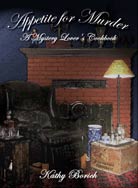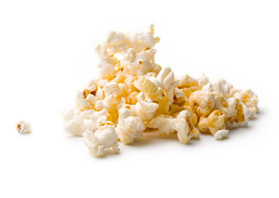Beauty in Trouble: Czech Chicken Paprikash Recipe
Year Released: 2008
Directed by: Jan Hrebejk
Starring: Ana Geislerova, Roman Luknar, Josef Abrham, Emilia Vasaryova, Jiri Schmitzer,
(Not Rated, 110 min.)

"Beauty in trouble flees to the good angel / On Whom she can rely." Robert Graves
The choice is a classic one – between sex and security. And yes, most of the characters in this Czech film are flawed, their relationships dysfunctional. They wound each other with lacerating truths even as they awkwardly reach out for love or something like it.
The "something like it" is the electrifying yet coarse sex that seems the only communication still open between Marcela (Ana Geislerova) and her husband Jarda (Roman Luknar). Otherwise their relationship is as bereft as their flooded out Prague home, as corrupt as the chop shop Jarda now runs out of the garage below.
It is also the strange bond between Marcela’s mother Liba (Emilia Vasaryova) and Richie (Jiri Schmitzer) who balances his raunchy advances toward her with wheedling complaints about having Marcela and the two children move in with them after the flood.
More "something like it" is the newfound security that the wealthy Evzen offers Marcela and her children, growing out of an awkward meeting at the police station as he files paperwork for the car her husband has stolen. Marcela, for her part, shows dignity here, only reluctantly accepting his dinner invitation, and then his offer of an empty apartment when her situation back with her mother and Richie becomes intolerable.
Then there is the headless devotion of Jarda’s mother toward her son, as well as a religious obsession that has replaced her dogmatic communist leanings, an observation wielded like a sword by the acid tongued Richie. She does not turn the other cheek to him, however, instead correctly pointing out his unquenchable need for love and attention outmatched only by his complete inability to give any back. For a while here, it’s as though I am back among my Italian aunts who knew just how to wound to the quick when they wished.
Now Evzen, a wealthy Tuscan only returning to Prague to settle some property, seems almost too good to be true. He is everything Jarda is not, sweet and sophisticated, offering dinner and respite for Marcela with no strings attached. And when she does welcome him into her bed, the children sleeping next door do not have block their ears as they did when Jarda was around. And here, neither are the audience members unwitting voyeurs to the scene, instead getting a glimpse of a closed door and nothing else.
Evzen’s kindness is not limited to beauties in trouble. He invites the despicable Richie to his Tuscan villa for a visit and even allows those living illegally in his Prague house to stay on until he sells it. But Evzen can only be taken so far, as he shows us when the freeloaders try to turn his kindness into an outrageous profit.
The character that anchors the film, however, is the unctuous Richie, who captures that human adaptation of making a pleasure out of pain, a survival technique probably not uncommon in much of Easter Europe, coming out of the horrors of World War II only to be suffocated by the yoke of communism. Richie is a diabetic and seems to take pleasure in his privations, especially when it allows him to righteously lecture Marcela’s children for having eaten every last one of his special sugar free cookies. His similarly sanctimonious screed on the redemptive power of truth empowers him to disabuse young Kuba of the notion that his father is off working in India instead of serving an ignominious prison sentence for car theft.
Beauty in Trouble echoes the American tradition of great playwrights like Tennessee Williams, Thorton Wilder, and Eugene O’Neill, focusing on man’s struggle to maintain his hope in the face of disillusionment and despair. It lacks the cinematic reassurance of American film fare, and tells a tale that is morally ambiguous and somewhat unresolved. Its characters survive. They do not prevail.
But it is a tale of authentic insight and beauty in its own way, a unique offering for discriminating viewers.
—Kathy Borich
Film-Loving Foodie
Evzen has not lived in Prague for some forty years and now resides at lovely Tuscan villa where he need only watch his grapes grow and sample their vintage. No wonder the bleak terraces of Prague fill him with no regrets, except, as he admits to Marcela, his memory of Chicken Paprikash. Marcela, whose taste in wine runs to the cheap and sweet -- her favorite being a toadstool, almost as repugnant as its name, some concoction of wine and soda – vows that even she can cook this national dish.
Marcela never does need to prove her skills here, however, as Evzen has a plump Italian cook at his villa who supplies his table with the delights of Italian country fare. And in Prague, Marcela is treated to upscale pubs and the dubious pleasures of sushi and ink squid black pasta.
Czech Chicken Paprikash
Ingredients
- 4 chicken breasts
- 1 medium onion
- 1 tbsp of sweet paprika (or more, as you like)
- 1/2 cup chicken broth
- 1/4 cup dry white wine
- 1/2 cup sour cream
- 1/8 cup of flour mixed with 1/4 cup water
- salt and pepper to taste
Directions
- Slice onion and sauté in olive oil over medium-high heat until translucent.
- Add paprika and mix until onions are coated.
- Reduce heat to medium. Add chicken breasts and lightly brown.
- Add wine and chicken stock. Simmer covered until chicken is tender, usually about 30 minutes.
- Take out the chicken. Add flour mixture (making sure to mix it very well leaving no lumps) and simmer 10 minutes until sauce thickens. Remove from burner and let cool for about 2 minutes.
- Slowly add sour cream to pan and mix well. Return to the burner on low heat. Do not boil or the sauce will curdle.
- Add salt and pepper to taste.
- Serve chicken on a bed of dumplings (see recipe below), rice, egg noodles, or gnocchi. Spoon sauce over top of chicken.
For a more savory flavor, try substituting tomato juice or sauce for the white wine.
Recipe Source: Suite101.com



 Rainy Day Rentals
Rainy Day Rentals